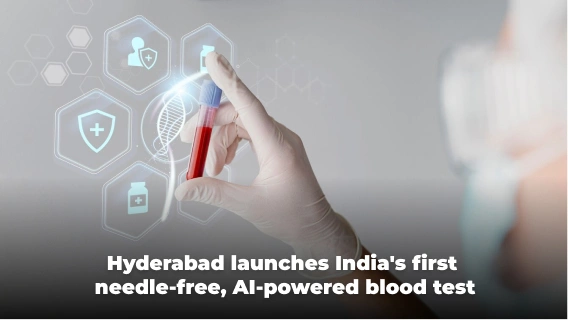Hyderabad Hospital Launches Genetic Test: Imagine a single blood test that could tell your doctor exactly which medicines are best for your body—not just today, but for the rest of your life. A breakthrough initiative by AIG Hospitals in Hyderabad, in collaboration with GenepoweRx, is bringing this futuristic vision to life. They have introduced an affordable pharmacogenomics test that allows doctors to prescribe medications based on an individual’s genetic makeup, marking a major leap forward in personalized healthcare in India.
Pharmacogenomics—an emerging field that merges pharmacology and genomics—focuses on how a person’s genes affect their response to medications. Until now, most prescriptions have followed a “one-size-fits-all” approach, meaning that drugs are given based on general population data rather than an individual’s unique biology. However, this method often results in ineffective treatments, unpredictable side effects, and unnecessary costs. The new genetic test aims to end this uncertainty, helping doctors tailor prescriptions that truly fit a patient’s body chemistry.
According to Dr. D. Nageshwar Reddy, Chairman of AIG Hospitals, this test represents a revolution in preventive and precision medicine. It costs just ₹5,000—nearly a fraction of the ₹80,000 charged for similar tests in Western countries. The affordability factor makes it accessible to a much wider population, aligning with India’s growing emphasis on precision healthcare and data-driven medicine.
What is Pharmacogenomics and Why Does it Matter?
Pharmacogenomics (PGx) studies how genetic variations influence drug metabolism, helping doctors predict how well a person might respond to a particular drug. The science is based on the understanding that no two people metabolize medications the same way. A drug that works effectively for one individual may be completely ineffective—or even dangerous—for another.
For instance, some people metabolize painkillers so fast that they get no pain relief at all, while others break them down too slowly, leading to harmful accumulation in the body. Similarly, the same antidepressant may work wonders for one person but cause severe side effects for another. Pharmacogenomics aims to remove this guesswork from medicine.
By using a simple genetic test, doctors can understand whether a patient needs a higher dose, a lower dose, or an alternative drug altogether. This enables personalized treatment plans, prevents adverse drug reactions (ADRs), and improves treatment success rates across various health conditions.
How the Test Works: A Glimpse Inside the Science
The pharmacogenomics test is both simple and sophisticated. A 2 ml blood sample is drawn at AIG Hospitals. From this sample, DNA is extracted and sequenced using advanced genomic platforms like Illumina and MGI—the same technologies used in international genomic research projects. The sequencing process generates about 5 GB of genomic data per patient, which is then analyzed by AI-powered bioinformatics systems.
The test evaluates 120 to 190 genes known to affect drug metabolism and efficacy. These genes influence how enzymes in the body process various medicines, including those used for heart disease, diabetes, cancer, gastrointestinal disorders, psychiatric conditions, neurological disorders, and pain management.
The results are compiled into a personalized pharmacogenomic report, which is delivered to the patient within 12 to 13 days. The report highlights which drugs will work best, which may cause side effects, and which require dose adjustments. Patients also receive a personalized report booklet—a lifelong health record that can be shared with any doctor, anywhere.
A Lifetime Guide to Personalized Prescriptions
One of the most powerful aspects of this test is its lifelong utility. Since a person’s genetic makeup does not change over time, the results can guide all future prescriptions. Whether a patient is diagnosed with a new disease years later or prescribed a new medication, doctors can use the same data to ensure the treatment is compatible with their genetic profile.
In essence, this test becomes a personalized drug response map—a lifelong guide that ensures medications are effective and safe, minimizing trial-and-error in treatments.
Read about: Non-Alcoholic Fatty Liver Disease (NAFLD): What Really Causes It and How to Fix It
Backed by Data: Research and Validation
The development of the pharmacogenomics test is based on a joint study involving over 2,000 Indian patients, conducted by AIG Hospitals and GenepoweRx. The study revealed that nearly 30% of patients were taking medications unsuitable for their genetic makeup.
In some cases, the drug dosage needed to be increased for effectiveness, while in others, it needed to be reduced to avoid toxicity. This mismatch was linked to poor treatment outcomes and avoidable side effects. The researchers also incorporated data from the UK Biobank, which includes around 15% Indian representation among one million participants, ensuring the test accounts for Indian genetic diversity.
Affordability and Impact: Redefining Healthcare Costs
At just ₹5,000, the pharmacogenomics test is highly affordable compared to international standards. In Western countries, similar tests cost upwards of ₹80,000 to ₹1 lakh. By lowering the cost barrier, AIG Hospitals aims to make personalized medicine accessible to the Indian middle class—not just the elite.
Moreover, by optimizing medication choices, the test can reduce overall healthcare costs by:
- Preventing over-prescription of unnecessary medications.
- Avoiding high dosages that can cause toxicity.
- Reducing hospitalizations caused by adverse drug reactions.
- Improving treatment efficiency, thereby reducing long-term medical expenses.
As Dr. Reddy puts it, “Beyond affordability, this test can significantly lower pharmaceutical costs while improving patient safety and treatment success rates.”

Why India Needs Pharmacogenomic Testing Now
India faces a unique healthcare challenge—its vast population and genetic diversity make standardized drug protocols less effective. Additionally, adverse drug reactions (ADRs) account for nearly 6–10% of hospital admissions in India, many of which could be prevented through genetic screening.
Given the growing burden of chronic diseases such as diabetes, cardiovascular disorders, and cancer, pharmacogenomics could help India shift from reactive treatment to predictive and preventive care. This test aligns perfectly with India’s Ayushman Bharat Digital Mission and the National Precision Health Initiative, aiming to integrate genomics into mainstream healthcare.
Expert Voices and Future Outlook
According to Dr. Hima Challa, Clinical Genomics Expert at Harvard Medical School and part of the AIG project, “Pharmacogenomic data is the key to safer, smarter, and more effective treatments. It bridges the gap between traditional prescription methods and the future of personalized medicine.”
Looking ahead, AIG Hospitals and GenepoweRx plan to expand the test’s coverage to include nutrigenomics (diet-gene interactions) and disease predisposition screening, creating a comprehensive genomic profile that could transform preventive healthcare in India.
Conclusion
The launch of the pharmacogenomics test by AIG Hospitals in collaboration with GenepoweRx marks a transformative moment in Indian healthcare. For the first time, a scientifically validated, affordable genetic test empowers doctors to prescribe the right medicine, in the right dose, for the right patient.
In a country as genetically diverse as India, this innovation is not just a medical milestone—it’s a step toward equitable and intelligent healthcare. The move also brings India closer to achieving the dream of precision medicine for all, rather than a privileged few.
The test promises to reduce medical errors, enhance treatment success, and lower healthcare costs—all while giving patients greater control over their health. For individuals dealing with chronic illnesses or long-term medication regimens, this could be a life-changing breakthrough.
As we move toward a future where healthcare is as unique as our DNA, pharmacogenomics will play a pivotal role in shaping personalized, data-driven medicine in India and beyond.
Frequently Asked Questions
1. What is a pharmacogenomics test, and how is it different from a regular blood test?
A pharmacogenomics test analyzes your DNA to understand how your body metabolizes different drugs, unlike a regular blood test that checks current health parameters like sugar or cholesterol levels. It helps doctors know which medicines will work best for you, minimizing trial and error.
2. Who should consider taking this test?
Anyone who takes long-term medications—especially for conditions like heart disease, diabetes, depression, epilepsy, or cancer—can benefit. It’s also valuable for people who’ve experienced unusual drug reactions or treatment failure with standard medications.
3. How accurate is the pharmacogenomics test offered by AIG Hospitals?
The test is highly accurate, using validated sequencing platforms (Illumina and MGI) and referencing global datasets like the UK Biobank. It evaluates over 120–190 genes linked to drug metabolism, providing a detailed and reliable drug-response profile.
4. Does this test need to be repeated over time?
No. Your genetic makeup remains constant throughout your life. Once done, the results are valid forever. You can use the same report whenever you are prescribed a new medicine or diagnosed with a new condition.
5. Can this test replace a doctor’s consultation?
Not at all. The pharmacogenomics test is a tool to assist doctors, not replace them. It gives physicians genetic insights that allow them to make better-informed decisions about your treatment plan. It enhances medical judgment—it doesn’t substitute it.












2 thoughts on “Hyderabad Hospital Launches Genetic Test That Tells Which Medicines Work for You”